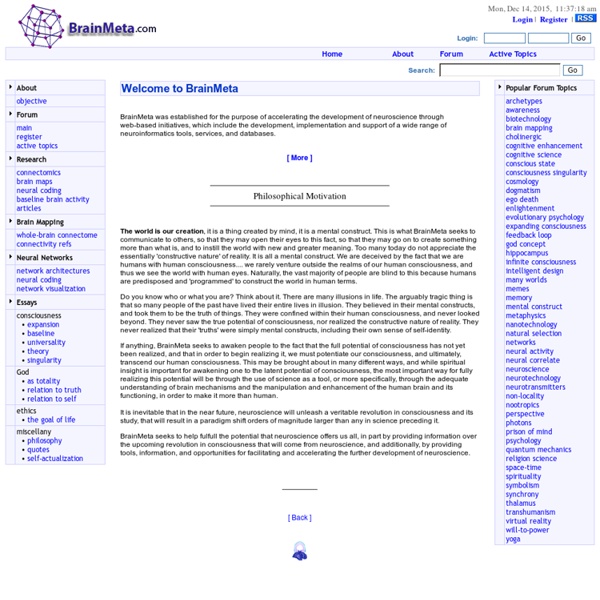



The Human Brain Biology - Brain Brain Waves When you drop a small stone in water, you see waves. Similarly our heart and our brain have wave patterns. The wave pattern of the heart is measured by ECG (electro cardiograph). Using the brain wave studies, scientists have discovered that our brain waves are of four types. The brain waves also have peaks that are similar to the peaks we see in water waves. Beta (13 to 25 cycles per second) This brain wave indicates that your conscious mind is in control. Left brain and right brain working together Usually the left brain and the right brain waves are independent. For both, the peaks are reached together. Scientists had long believed that brain activity such as brain waves and secretion of brain chemicals were beyond conscious control. Back to Contents Brain Activity During Meditation The brain is an electrochemical organ - using electromagnetic energy to function. There are four categories of these brainwaves. During meditation brain waves alter.
Neuroscience News - Neuroscience Research Articles - Neurology Brain Research AI Psychiatry Psychology Medicine Genetics - Free Neuroscience Social Network - Jobs Videos Books Forums Labs Blogs Discussion Groups Some brain wiring continues to develop well into our 20s The human brain doesn't stop developing at adolescence, but continues well into our 20s, demonstrates recent research from the Faculty of Medicine & Dentistry at the University of Alberta. It has been a long-held belief in medical communities that the human brain stopped developing in adolescence. But now there is evidence that this is in fact not the case, thanks to medical research conducted in the Department of Biomedical Engineering by researcher Christian Beaulieu, an Alberta Innovates – Health Solutions scientist, and by his PhD student at the time, Catherine Lebel. "This is the first long-range study, using a type of imaging that looks at brain wiring, to show that in the white matter there are still structural changes happening during young adulthood," says Lebel. The duo recently published their findings in the Journal of Neuroscience.
genetic-programming.org-Home-Page Brain Atlas - Introduction The central nervous system (CNS) consists of the brain and the spinal cord, immersed in the cerebrospinal fluid (CSF). Weighing about 3 pounds (1.4 kilograms), the brain consists of three main structures: the cerebrum, the cerebellum and the brainstem. Cerebrum - divided into two hemispheres (left and right), each consists of four lobes (frontal, parietal, occipital and temporal). The outer layer of the brain is known as the cerebral cortex or the ‘grey matter’. – closely packed neuron cell bodies form the grey matter of the brain. Cerebellum – responsible for psychomotor function, the cerebellum co-ordinates sensory input from the inner ear and the muscles to provide accurate control of position and movement. Brainstem – found at the base of the brain, it forms the link between the cerebral cortex, white matter and the spinal cord. Other important areas in the brain include the basal ganglia, thalamus, hypothalamus, ventricles, limbic system, and the reticular activating system. Neurons
Welcome to the Possibilium Brain Explorer The neurobiology of politics What, if anything, should we make of studies that purport to find neurological differences between people who self-identify as "conservative" and people who self-identify as "liberal?" You've seen studies like that in the paper. You've heard them argued about on radio and TV shows. Behavioral therapist Andrea Kuszewski has a great guest post up at The Intersection blog, looking at what we can (and can't) learn from the handful of studies that have attempted to link politics and neurobiology. If you're going to talk about these studies at all, Kuszewski writes, you're going to have to understand the context behind them. This is definitely a story worth reading all the way through. 1.
genetic-programming.com-Home-Page Cell Cycle & Cytokinesis - BioChemWeb.org Cell Cycle Regulation and the Control of Cell Proliferation (Cell Growth + Cell Division) Cell Cycle Research - General resource with links to relevant recent literature, news and job listings. (Ion Channel Media Group) Cell Division - Undergraduate-level lectures on cell division. (Cell Biology Lectures, Mark Hill, University of New South Wales, Australia) The Eukaryotic Cell Cycle and Cancer - Introduction to the eukaryotic cell cycle as it relates to the genetics of cancer. (Phillip McClean, North Dakota State University) (Just above Beginner's Level) ICRF FACS Laboratory Cell Cycle Analysis - Methods for cell cycle analysis using flow cytometry. (FACS Laboratory, Imperial Cancer Research Fund, UK) The Interactive Fly: Evolutionarily Conserved Pathways (Society for Developmental Biology). See also the Apoptosis, Cell Senescence and Signal Transduction pages. Mitosis, Meiosis and the Mechanics of Cell Division See also the Cytoskeleton, Cell Motility and Motors page. Cancer Resources
Neuroscience of Music - How Music Enhances Learning - Neuroplasticity Neuroscience research into the neuroscience of music shows that musicians’ brains may be primed to distinguish meaningful sensory information from noise. This ability seems to enhance other cognitive abilities such as learning, language, memory and neuroplasticity of various brain areas. Scientific review of how music training primes nervous system and boosts learning Those ubiquitous wires connecting listeners to you-name-the-sounds from invisible MP3 players, whether of Bach, Miles Davis or, more likely today, Lady Gaga, only hint at music’s effect on the soul throughout the ages. Now a data-driven review by Northwestern University researchers that will be published July 20 in Nature Reviews Neuroscience pulls together converging research from the scientific literature linking musical training to learning that spills over to skills including language, speech, memory, attention and even vocal emotion. Contact: Pat Vaughan Tremmel Source: Northwestern University